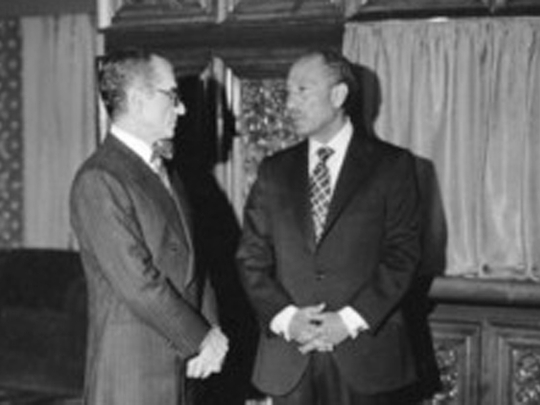
Cairo: Egyptian President Mohammad Mursi’s visit to Iran this week, the first by an Egyptian president to Tehran since the mid-1970s, is likely to revive Cairo’s influence in the region, according to analysts.
“This landmark visit is an attempt to regain Egypt’s regional role, which was seriously diminished under [toppled president] Hosni Mubarak,” said Salah Al Hadi, a political expert.
In 1980, Tehran severed diplomatic ties with Cairo in protest against the latter’s peace treaty with Israel and hosting of the deposed Shah of Iran, who was later buried in Egypt.
Still, Iran and Egypt have kept an interest section in each other. Their relations were tense in most of the 30 years of Mubarak’s rule.
Signs of improvement emerged after a popular revolt unseated Mubarak in February last year and propelled Islamists on to Egypt’s political stage.
“However, Mursi’s visit will not signal a quick return of full ties between Egypt and Iran. Such full normalisation has its own calculations, which are related to the situation inside Egypt and the regional scene as a whole,” Al Hadi told Gulf News .
Despite the looming thaw in the Cairo-Tehran ties, there are fears in Sunni Muslim Egypt that Shiite Iran will seek to promote Shiitism in this country of 82 million people.
According to the state-run newspaper Al Ahram, Mursi will on Thursday stop over for four hours in Tehran, on his way back from a trip to China, during which he will hand over the rotating presidency of the Non-Aligned Movement (NAM) led by Egypt in the past three years to Iran. Mursi, who took office in June as Egypt’s first elected civilian and Islamist president, will also address a NAM summit in Tehran.
The Iran visit comes two weeks after Mursi made his second visit as a president to Saudi Arabia where he conferred with Iranian President Mahmoud Ahmadinejad at a conference of Muslim leaders. Saudi Arabia, a Sunni Muslim country, was a staunch ally of Mubarak.
During the conference, held in the Saudi city of Makkah, Mursi proposed setting up a contact group on Syria comprising Egypt, Saudi Arabia, Iran and Turkey.
“No one can play a real role towards resolving the Syrian crisis without having strong relations with all active parties involved, including Iran,” said Mustafa Al Labad, an analyst.
“Previous initiatives on Syria have failed because they excluded Iran,” he added.
Iran is a major regional ally of Syrian President Bashar Al Assad and has advocated his deadly crackdown on a pro-democracy revolt. Mursi has, meanwhile, denounced Al Assad’s clampdown, but stopped short of backing a foreign military intervention in Syria.
“Mursi’s visit to Iran may open the door for initiating a solution to the Syrian problem,” said Al Labad.
Cautioning against high expectations from the visit, he added that a resumption of full ties between Egypt and Iran would not signal the creation of a “strategic alliance” between the two countries.
“There are Gulf countries who maintain full relations with Iran despite their conflicting interests. It is important for Egypt to have good ties with Iran, a matter that will give it [Egypt] a bigger latitude to restore its regional role.”
Following Mursi’s election win in June, Ahmadinejad contacted him and described his victory as an “Islamic awakening in the region”, reported Iranian media.
Mursi’s Islamist allies are displeased with the visit, though. “This visit means betraying the blood of the martyrs in Syria,” said Ali Ghalab, an ultra-conservative Salafist cleric.
“Iran and its [Lebanese Shiite] Hezbollah continue to support the tyrant Bashar Al Assad. Therefore, Mursi has to cancel immediately his plan to visit Iran,” added Ghalab.
Mursi’s Muslim Brotherhood has defended the visit. “It is better for Mursi to go to Tehran to tell the Iranian officials that they are committing a mistake and a crime against the Syrian people,” said Mahmoud Ghuzlan, a spokesman for the Muslim Brotherhood.
“The visit is an attempt to pressure Iran to stop its support to the Syrian regime. Egypt is not seeking to normalise relations with Iran at the expense of the Syrians and Gulf security,” he told Al Ahram.
Under Mubarak, Egypt repeatedly accused Iran of meddling in the affairs of the Gulf countries and supporting militant groups. Days after taking office in June, Mursi said that Gulf security is vital for Egypt and is a “red line”.












